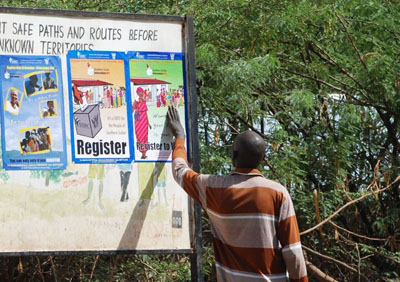
After months of delay resulting from political disagreement between the two ruling Sudanese parties, voter registration for South Sudan’s referendum belatedly began yesterday in Sudan and in the eight countries around the world that host the largest southern Sudanese populations. Registration will run for 17 days, until December 1, with polls set to open on January 9.
In the capital of Juba, where several media reports noted long lines of eagerly waiting voters, South Sudan President Salva Kiir showed off an inked finger after registering as a voter himself. "A referendum happens only once. People must come out en masse otherwise it would mean people fought and died for nothing,” he told al-Jazeera, referring to the 20-year civil war that ended in 2005 with a peace deal that gave southerners the chance to vote for independence or secession.
In the North, according to Reuters, the registration was comparatively “subdued.”
During the registration process, voters are required to mark their fingers with permanent ink so that they cannot register more than once. During Sudan’s elections in April, the use of non-permanent ink in some polling stations led a handful of domestic observer groups to allege fraud. In January, voters are supposed to cast their vote at the station where they registered. This process was also muddled during the April elections, when many voters returned to their registration site to find that they were required to vote elsewhere.
At least 60 percent of registered voters must turn out on polling day for the referendum to be considered legitimate. The high threshold has provoked fears of manipulation, even prompting officials in the ruling southern party to tell southern Sudanese in Uganda to boycott the registration there over concerns about possible issuance of false national ID cards. In a statement (pdf) released over the weekend, domestic observation group SuNDE—made up of over 75 civil society organizations from South Sudan—expressed concerns over the referendum commission’s belated publication of the location of registration sites and the vagueness of voter eligibility:
It is unclear how Referendum Officials will make decisions regarding the eligibility of applicants particularly in the North and in border areas where the physical appearance of an applicant may not be sufficient to determine whether the applicant is Southern Sudanese. The lack of clarification on eligibility requirements could cause eligible voters to be denied registration and ineligible voters to be registered and leaves the voter registration process vulnerable to manipulation.
Members of the U.N. panel charged with monitoring the referendum arrived on the eve of the registration to observe the process. “We will be watching very closely,” noted the panel’s chair. A number of election observers have also been deployed by the Carter Center and the European Union.

